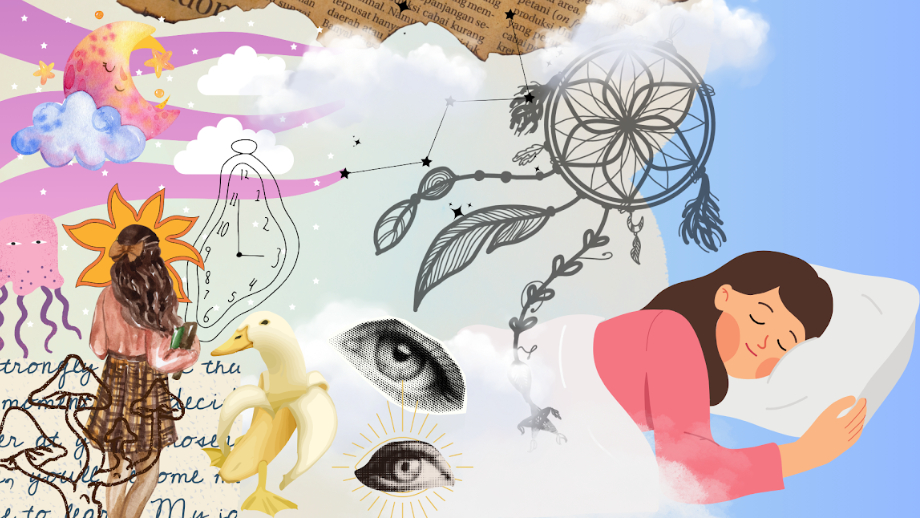Meaning of Dreams
A graphic of peoples dreams (Jodi Bailie, The Puma Prensa)
Written By: Jodi Bailie, staff writer
It’s morning, and today’s a big day for you. There’s a school rally during lunch and you signed up to participate in a competition with some friends. You’ve seen fellow students fail to succeed before and you won’t let your team down. Seconds left on the clock, the crowd is chanting, your heart is pounding in your throat. You see an opportunity. You take the shot, and…
It’s morning, again, and you realize it was just a dream. None if it was true, but it felt so real. Eventually the dream will be forgotten and the day will continue; but there must have been some significance in that dream.
Dreams are imaginary situations that occur in our sleep, most commonly observed during Rapid Eye Movement– or simply known as REM. When sleeping, during a portion of the night, a person’s eyes move continuously under their eyelids, causing the most vivid dreams. It’s during REM where it is possible to both lucid dream and stimulate your sensory system: when you become aware you’re dreaming, making it possible to feel your surroundings.
Maria Carrillo High School psychology teacher Jerry Deakins explains two more important theories that stem from the world's first psychologists Sigmund Frued and Carl Jung, who couldn’t agree if dreams were either a direct reflection of wishful thinking or a message delivered from the brain. There continues to be an expanding interpretation as to why people have these illusions, but those who study dreams observe recurring themes such as destruction and fantasy.
Dropping teeth, falling, and even the end of the world are specific topics within the catagory of destruction. Anxiety, personal loss and struggling with control are contributors to these stress inducing dreams. It is most likely that someone experiencing a chaotic dream is neglecting the present, being held back by the past, or even being paranoid about the future.
When dreams are most vivid, it’s easier to be fully absorbed in a state that can evoke emotions such as happiness, sadness, fear, and anger. It’s not uncommon to be rudely awoken by a scary dream, having a noticeably faster breathing rate and almost instantly forgetting why you were awake in the first place. MCHS students who recall their dreams have mentioned a sudden responsibility that forces them in an uncomfortable and unfamiliar position. Dreaming of being in a car without a driver, or being stuck in a room as people leave the dreamer, evoke the most memorable emotion in dreams: fear and anxiety.
MCHS Senior Sierra Gwillim has experienced levels of anxiety throughout her dreams, her most memorable dream forces her to manage an unruly car. “With the car I would be scared because I had to turn the car the right way, I had to protect my brother,” she explained, “I’d be super anxious, trying to… be safe so we don’t hit anything.”
Similar to destruction, emotional dreams are produced by high levels of stress, but what makes these dreams different is the amount of stress hormones released. Someone experiencing such intense dreams is most likely overwhelmed and it is suggested to find ways to lessen whatever is triggering the stress.
Dreams aren’t all dread and misery. The ability to fly, to imagine someone familiar like a friend or family member; during REM sleep there is an unlimited imagination. Flying is known for its symbol of freedom, a desire to break free from whatever is holding the dreamer back. Many people who’ve flown in dreams stated the flying experience was pleasant and joyful. Seeing familiar beings in dreams can be interpreted differently depending on the interaction between the dreamer and the being. Generally, the reaction to seeing a familiar person reflects the true feelings towards said person. If you are happy or excited to see a dream version of someone, it is most likely this person gives you comfort.
Scientifically, there isn’t a defined reason as to why people have dreams. Not to discourage you from interpreting your dreams, but psychologists and scientists have been looking for “why” since 2000 BC, when ancient Egyptians began recording their dreams. To better understand the sleeping mind, there’s no better test subject than yourself. Writing down even small fragments after you wake up can help better analyze personal dreams, as there are symbols that are individual to everyone. Who knows, the first step to grasping the unknown is to wake up.

